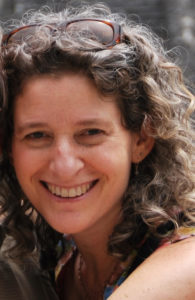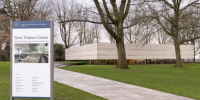In this second part of a two part interview, I talk with Jeannie Blaustein to hear about her experience with end of life, and how she became the founding chair of Reimagine. Jeannie has a PhD in Clinical Psychology from City College of New York as well as her Doctorate of Ministry in Pastoral Studies and Counseling from New York’s Hebrew Union College – Jewish Institute of Religion.
Editor’s Note: This interview has been edited for length and readability.
 Colleen Ferguson: I’d love to talk about your life before you became the founding chair of Reimagine. How did you become interested and involved with end of life?
Colleen Ferguson: I’d love to talk about your life before you became the founding chair of Reimagine. How did you become interested and involved with end of life?
Jeannie Blaustein: Well, I grew up in a family that never talked about death. We just didn’t talk about it. And as I became a parent, I became more aware that I wanted to become more fluent in that language. I wanted to be able to talk to my kids about life and death. So I became a hospice volunteer, and it was also during this time I decided to get my doctorate in Ministry in Pastoral Studies.
I met a woman named Sally Kaplan who was very involved in the Jewish community and had an advanced care planning project called, “What Matters: Caring Conversations about End of Life.” This was a project done in the Respecting Choices model, which is a program designed to create a culture of healthcare that honors someone’s goals and values for the present and the future. The goal of the Caring Conversations project was similar, in that it aimed to heighten awareness about preparing for end of life. So I began facilitating those conversations in my community and was exposed to so much that was needed in that realm. Even though I had a clinical background in this stuff, for the last 15 years I had basically been playing catch-up integrating end of life.
Colleen: And how did you become involved with Reimagine? How did you first hear about it?
Jeannie: I was actually on the East Coast listening to public radio and had tuned into San Francisco’s live stream – Dr. Dawn Gross on KALW – a program called “Dying to Talk.” At the moment I tuned in, they were talking about the first Reimagine End of Life event happening in San Francisco in 2016. I immediately thought, “I’m going to go.” And I’m so glad I did.
The first event blew my mind – it was very surprising. There were about 200-300 people there, about half the group was under 40, and about half weren’t even professionally connected.
Colleen: Oh, wow. I would have assumed most attendees were in the industry or connected in some way.
Jeannie: Yes, it was very interesting that so many people who attended weren’t the usual people in the room. It was very intimate — we were talking about a difficult topic, hugging, listening, crying, sharing, and having a good time. It was a very surprising and positive situation.
The entire thing inspired me to talk to the host (who was also the executive director) Brad Wolf. I approached him and said, “Have you ever thought about taking this on the road? I’d love to bring it to New York.”
And that started the ball rolling. We talked with IDEO for about 6 months, and they very generously allowed us to take up the license of the intellectual property: That’s when it became a non-profit entity. We began developing a board and planning for the next San Francisco Reimagine Event (which took place in Spring 2018).
Colleen: Once you were established as a non-profit and you were on the board, what did you do differently with the second San Francisco event?
Jeannie: What was exciting about the San Francisco event is that we were invited to partner to apply for funding, and we created a formal partnership with the Palliative Care Workgroup. We also got set up so we could receive charitable donations.
We were also able to do a lot more community outreach and work with Community Based Organizations. We were really honored and pleased to be working with these CBOs, because they were able to build relationships with communities that are more vulnerable, such as mono-lingual communities. This wasn’t so much a focus in 2016.
What this allowed us to do was to make the event inclusive, which is important. We now have dedicated community outreach, and we’re trying very hard to work with CBOs, faith communities and communities of color to really shine a light on different cultures and their needs around end of life.

Credit: letsreimagine.org
Colleen: That’s really wonderful. Looking to the future, where do you see Reimagine End of Life going over time?
Jeannie: We’re dreaming big and starting big! We would love to have anchor cities, like San Francisco and New York, and we also envision developing it so smaller cities can do this on a smaller scale. We’d like to make it so more cities and communities can engage with different models.
So many of us don’t want to talk about aging; we don’t want to get sick; and we don’t want to talk about dying. But it’s happening, and part of the long-term vision of this is to make it easier for people to get into the conversation.
We know there’s a hunger to reconnect with the humanity of our lives. Death is an undeniable, unavoidable fact of our humanity and there’s something really liberating, humanizing and heartening about coming together to discuss these things. Reimagine End of Life helps us come into the reality of that.
If you missed Part One of our interview with Jeannie Blaustein catch up here.

 How Did You Become Involved with Reimagine End of Life?
How Did You Become Involved with Reimagine End of Life?


 KAAN Architecten’s New Visitor Center at the Netherlands American Cemetery
KAAN Architecten’s New Visitor Center at the Netherlands American Cemetery
 “Prayer” by Lizzie West
“Prayer” by Lizzie West
 Rutgers Health Study May Improve End-of-Life Care
Rutgers Health Study May Improve End-of-Life Care














